Vermont Vehicle Sales Tax & Fees [+ Calculator]
February 29, 2024
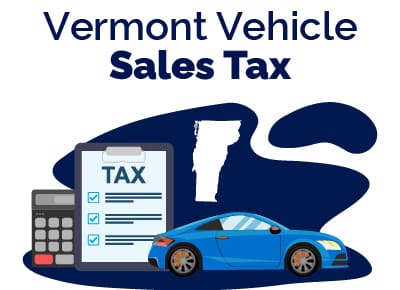

Michael Collado is a car buying expert and has been a professional automotive writer since 2009. He’s written about dealership sales, vehicle reviews and comparisons, and service and maintenance for over 100 national automotive dealerships. Previously, Collado was a copywriter at the ad agency TBWA/Chiat/Day where he worked on brand campaigns for Nissan, ABC Television, Sony PlayStation, and Energizer. His recognition in the ad industry includes awards from Communication Arts and The Clios.
Collado has a Bachelor’s degree from the University of South Florida, with a major in Psychology and a minor in Marketing.
Understanding Vermont vehicle sales tax and other fees doesn't have to be a headache.
Our expert editors are here to break it all down for you. From the standard 6% to potential local surcharges, we've got the insights and tips to help you save.
We’re here to guide you through, ensuring you get the best deal with no surprises.
Table of Contents
- How Much Is the Car Sales Tax in Vermont?
- How to Calculate Vermont Sales Tax on a Car
- Vermont Car Sales Tax Calculator
- Do I Have to Pay Sales Tax on a Used Car?
- Which County Has the Highest Tax? Which Has the Lowest?
- Car Sales Tax for Trade-Ins in Vermont
- Car Sales Tax on Private Sales in Vermont
- Tax on Rebates & Dealer Incentives
- Vermont DMV/State Fees
- Example of Estimated Total Vehicle Purchase Costs in Vermont
- When Sales Tax Is Exempt in Vermont
- Comparing Vermont’s Vehicle Sales Tax to Neighboring States
- Vermont EV Rebates & Incentives
- Conclusion
- Best Car Deals by Category
- Frequently Asked Questions
How Much Is the Car Sales Tax in Vermont?
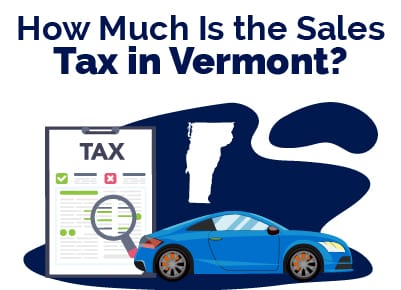
The state sales tax on a car purchase in Vermont is 6%. Therefore, you will be required to pay an additional 6% on top of the purchase price of the vehicle.
However, this does not include any potential local or county taxes.
The average local tax rate in Vermont is 0.156%, which brings the total average rate to 6.156%.
How to Calculate Vermont Sales Tax on a Car
You can calculate the sales tax in Vermont by multiplying the final purchase price by .06%.
For example, let’s say that you want to purchase a new car for $30,000, you would use the following formula to calculate the sales tax:
$30,000 x .06= $1,800
This means that your sales tax is $1,800 on a $30,000 purchase price.
Calculate Car Sales Tax in Vermont Example:
- Initial Car Price: $30,000
- Sales Tax Rate: 6%
- Trade-In Amount: $5,000
- Manufacturer/Dealer Rebate: $2,000
Sales Tax = ($30,000 - $5,000 - $2,000) * .06
Sales Tax = $1,380
Remember that the total amount you pay for a car (out the door price) not only includes sales tax, but also registration, and dealership fees.
Vermont Car Sales Tax Calculator
Do I Have to Pay Sales Tax on a Used Car?
Yes, in Vermont you must pay the car sales tax on a used vehicle. The sales tax rules remain the same whether the car is new or used.
Still, purchasing a used car is a wise choice for many. The overall price will be lower, which means you will pay less in sales tax than with a new vehicle.
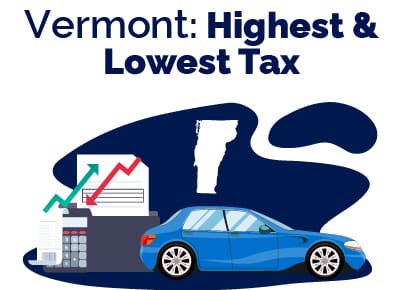 Which County Has the Highest Tax? Which Has the Lowest?
Which County Has the Highest Tax? Which Has the Lowest?
Several counties have a sales tax rate of 7% (maximum). They include Addison, Bennington, Chittenden, Franklin, Lamoille, Rutland, Washington, and Windham counties.
Several counties have a sales tax rate of 6% (minimum). They include Caledonia, Essex, Grand Isle, Lamoille, Orange, Orleans, and Windsor counties.
| Addison | |
| Bennington | |
| Caledonia | |
| Chittenden | |
| Essex | |
| Franklin | |
| Grand Isle | |
| Lamoille | |
| Orange | |
| Orleans | |
| Rutland | |
| Washington | |
| Windham | |
| Windsor |
Car Sales Tax for Trade-Ins in Vermont
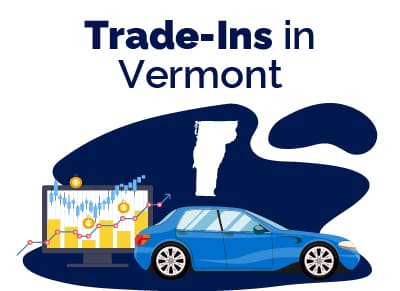 You don’t have to pay sales tax on trade-ins in Vermont. In other words, be sure to subtract the trade-in amount from the car price before calculating sales tax.
You don’t have to pay sales tax on trade-ins in Vermont. In other words, be sure to subtract the trade-in amount from the car price before calculating sales tax.
As an example, let’s say you are purchasing a new SUV for $35,000 and your trade-in is worth $10,000. You will subtract the trade-in value by the purchase price and get $25,000. Therefore, your car sales tax will be based on the $25,000 amount.
Car Sales Tax on Private Sales in Vermont
A sales tax is required on all private vehicle sales in Vermont. While there are no savings in taxes, there are other factors to consider for private sales in VT. Here are a few:
Pros
- Potential for lower prices than at dealerships.
- Direct negotiation between buyer and seller.
- Personalized transaction process.
Cons
- No warranties or guarantees provided.
- Responsibility on buyer for vehicle checks.
- Financing options may be less straightforward.
Tax on Rebates & Dealer Incentives
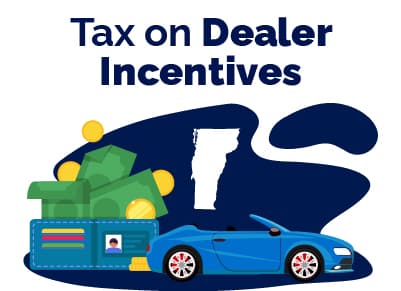
You do not have to pay tax on dealer and manufacturer rebates in Vermont. In other words, be sure to subtract the rebate/incentive amount from the car price before calculating sales tax.
As an example, if you are purchasing a new car for $30,000 with a $5,000 rebate, you will pay sales tax on the $25,000 cost of the car.
Vermont DMV/State Fees
There are some other state and DMV fees associated with the purchase of a vehicle in Vermont.
A few of these fees include:
- Registration Fee: $91 (gas-powered or diesel-powered)
- Registration Fee: $89 (electric)
- Title Fee: $42
- Plate Transfer Fee: $30
Vermont Dealership Fees
Dealerships apply extra fees, sometimes referred to as “doc fees,” with the sale of the car.
Though these fees vary based on the dealership, the average fee in Vermont is $210, with no statewide limit on how much dealerships can charge.
Example of Estimated Total Vehicle Purchase Costs in Vermont
Below is an example of the total purchase costs for a vehicle in Vermont. It’s not a complete figure since we can’t account for each local county and city’s individual taxes. However, this will give you a ballpark of what you’ll be looking at when purchasing a $15,000 vehicle.
| Vehicle Purchase Price | ||
| State Sales Tax (6%) | ||
| Registration Fee | ||
| Title Fee | ||
| License Plate Transfer Fee | ||
| Documentation Fee | ||
| Total Estimated Cost |
When Sales Tax Is Exempt in Vermont
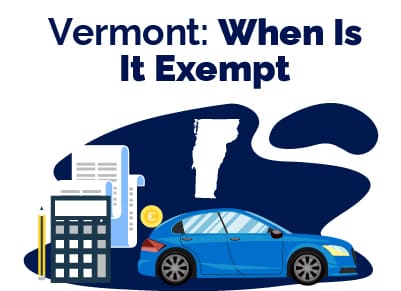
Much like every state, Vermont has some sales tax exemptions for vehicle sales. Exemptions include:
- Receiving the vehicle as a gift from a spouse, parent, child, grandparent, or grandchild.
- Inheriting the vehicle.
- Receiving the vehicle in a divorce.
- Receiving the vehicle from an individual’s revocable trust.
Comparing Vermont’s Vehicle Sales Tax to Neighboring States
If you're a Vermonter who finds the perfect ride outside this cozy state, no worries! When you bring that beauty back to Vermont, just keep in mind that the Purchase and Use Tax will greet you at registration. The deal is that it's a flat 6% on the purchase price or the vehicle's NADA clean trade-in value—whichever is greater. So, it's pretty straightforward.
| Vermont | |
| New Hampshire | |
| Massachusetts | |
| New York |
Vermont EV Rebates & Incentives
There are a handful of EV incentives in Vermont. This is on top of the up to $7,500 rebate offered by the federal government.
The state's program, overseen by the Center for Sustainable Energy, provides incentives varying by income level and vehicle type. For new EVs, rebates can range from $2,500 to $5,000, with additional incentives available for used vehicles and through the Replace Your Ride program, aimed at replacing flood-damaged vehicles.
Tax information and rates are subject to change, please be sure to verify with your local DMV.
Conclusion
Wrapping up our journey through Vermont's vehicle sales tax and fees, it's clear that understanding these costs is crucial for any car buyer in the Green Mountain State. From the standard 6% sales tax to various DMV fees to the potential for additional local taxes, being informed can save you surprises down the road. And for those eyeing a cleaner, greener ride, Vermont's incentives for electric vehicles could offer significant savings.
Ready to dive deeper into the world of smart car buying and stay ahead of the latest deals and tips? Sign up for FTBCP's newsletter and get the scoop straight to your inbox.
Best Car Deals by Category
Frequently Asked Questions
What is the sales tax on a car purchased in Vermont?
The sales tax on a car purchased in Vermont is 6%. As an example, if you purchase a new SUV for $60,000, then you will have to pay $3,600 in sales tax to the Vermont DMV.
Do I have to pay sales tax on a used car in Vermont?
You will have to pay a 6% sales tax on a used vehicle purchase. For example, if you are purchasing a used truck for $30,000, then you will pay an additional $1,800 in car sales tax.
Which county in Vermont has the lowest tax?
Several counties have a sales tax rate of 6%. They include Caledonia, Essex, Grand Isle, Lamoille, Orange, Orleans, and Windsor counties.
Which county in Vermont has the highest tax?
Several counties have a sales tax rate of 7%. They include Addison, Bennington, Chittenden, Franklin, Rutland, and Windham counties.
Do I have to pay sales tax on a gifted car in Vermont?
You do not have to pay sales tax if the vehicle is gifted to you from a spouse, parent, child, grandparent, or grandchild.
How much is registration in Vermont?
- Car Registration Fee: $76 per year (gas-powered or diesel-powered vehicles)
- Car Registration Fee: $74 per year (electric-powered vehicle).
- Car title fee: $35 (required for vehicles 15 years or newer).
Does a trade-in reduce sales tax in Vermont?
You can reduce your sales tax with a trade-in. As an example, if you purchase a new SUV with the price of $50,000 and your trade-in is worth $15,000, then your sales tax will be based on the $35,000.
How can I avoid paying sales tax in Vermont?
The following events are not taxable when it comes to vehicle transfers:
- If you inherited the vehicle.
- You receive the vehicle from an individual’s revocable trust.
- You receive the vehicle in a divorce.
- You receive the vehicle as a gift from a spouse, parent, child, grandparent, or grandchild.
Posted in Car Buying Tips |




